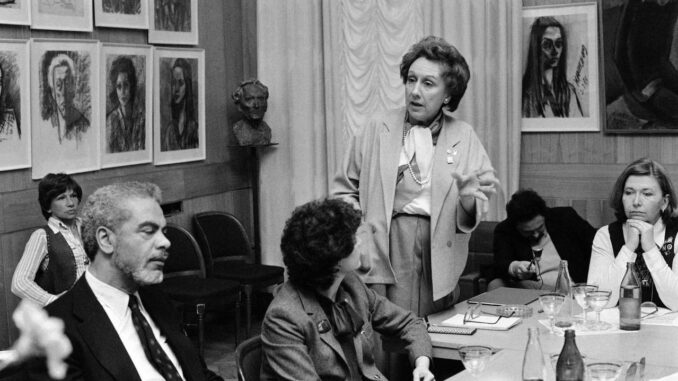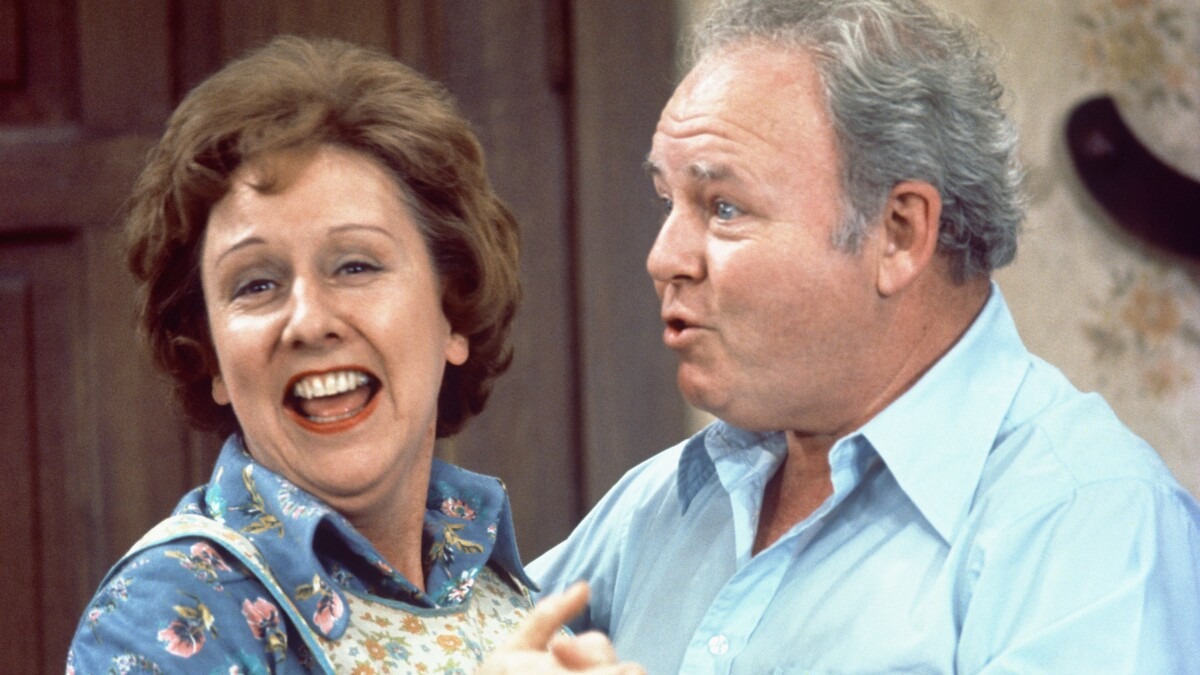
When people think of All in the Family, one face immediately comes to mind — Edith Bunker, the kind-hearted, endlessly patient wife of Archie. Played by the incomparable Jean Stapleton, Edith became the emotional core of the groundbreaking sitcom. But behind the laughter and applause, Stapleton’s final years were marked by quiet dignity, introspection, and a touching farewell that still resonates with fans decades later.
The Woman Who Brought Edith Bunker to Life
Jean Stapleton wasn’t just playing a character — she was embodying a generation. Her portrayal of Edith Bunker captured the tenderness, humor, and strength of everyday women who held their families together through love and patience. With her unique voice, warm smile, and unshakable moral compass, Edith became one of television’s most beloved characters.
A Revolutionary Role for Its Time
In the 1970s, All in the Family shattered boundaries. While Carroll O’Connor’s Archie Bunker became a symbol of outdated beliefs, Edith represented compassion and quiet resilience. Stapleton infused the role with a depth that made audiences laugh one moment and tear up the next.
Her performance wasn’t flashy — it was authentic. She made “dingbat” endearing and gave America a mirror to see both its flaws and its heart.
Why Jean Stapleton Stepped Away from Edith
By the late 1970s, after nearly a decade as Edith, Stapleton decided it was time to move on. She didn’t want to be trapped by one iconic role, no matter how beloved.
She once said, “Edith and I have nothing in common — I played her, but I’m not her.” That separation between actress and character was crucial for her personal and creative growth.
Her departure from Archie Bunker’s Place (the spin-off that continued after All in the Family) marked the end of an era. In one of TV’s most emotional episodes, Edith Bunker’s death was revealed — a moment that broke millions of hearts.
Life After Edith: The Quiet Years

After leaving the role that made her a household name, Stapleton embraced a quieter, more selective career. She appeared in theater, guest-starred on television, and continued to act in projects that inspired her creatively rather than commercially.
She was never one to chase fame. Instead, she focused on meaningful work and personal peace — a choice that reflected her integrity as both an artist and a person.
A Private Battle Out of the Spotlight
In her later years, Jean Stapleton largely retreated from public life. While fans continued to rewatch All in the Family reruns, Stapleton lived quietly, away from Hollywood’s glare.
Her health began to decline, but true to form, she handled it with grace and strength — without fanfare, without seeking sympathy. When she passed away in 2013 at the age of 90, it wasn’t just a loss for television — it was the end of a golden era of storytelling.
Fans Reacted with Heartfelt Tributes
The outpouring of love following Stapleton’s passing was overwhelming. Social media flooded with clips of Edith singing “Those Were the Days,” emotional quotes, and personal tributes.
People didn’t just remember her as Edith — they remembered her as comfort. She was the gentle counterbalance to Archie’s loud opinions, the moral anchor in America’s living rooms.
Norman Lear’s Tribute to His Star
All in the Family creator Norman Lear called her “a genius,” saying she had a way of turning ordinary dialogue into poetry. Her chemistry with Carroll O’Connor was lightning in a bottle — something that can’t be recreated, only remembered.
Lear reflected, “Jean Stapleton was the soul of Edith Bunker. Without her, there would be no All in the Family as we know it.”
The Emotional Impact of Edith Bunker’s Death
When Archie Bunker’s Place revealed that Edith had passed away off-screen, the nation mourned. The episode, titled “Archie Alone,” featured Archie sitting in their empty bedroom, breaking down while clutching Edith’s slipper — a raw and unforgettable moment.
That scene wasn’t just acting. It was real heartbreak for fans who felt like they’d lost someone in their own family.
Jean Stapleton’s Legacy in Modern Television
Even decades later, Edith Bunker remains a touchstone for how sitcoms can mix humor with heart. Shows like The Conners, Modern Family, and Everybody Loves Raymond owe part of their emotional DNA to All in the Family.
Stapleton’s work helped redefine what “real” characters looked like — flawed, funny, and full of heart.
Why Edith Still Matters Today
Edith Bunker represents the soul of kindness in an increasingly divided world. Her empathy, her laughter, her unwavering belief in good — those traits feel timeless.
In an era dominated by sarcasm and cynicism, revisiting Edith feels like stepping back into warmth and sincerity.
Jean Stapleton: A Woman Ahead of Her Time
Off-screen, Stapleton was as thoughtful as she was talented. She supported social causes, encouraged young artists, and never let Hollywood fame define her.
In many ways, she was the anti-celebrity — preferring integrity over popularity, depth over glitz.
The Quiet Farewell That Spoke Volumes
Jean Stapleton didn’t need a big send-off or a Hollywood spotlight to mark her goodbye. Her legacy speaks louder than any awards or speeches.
Her death might have been quiet, but her impact was monumental. She taught generations that kindness could be powerful, humor could be healing, and simplicity could be profound.
Remembering the Real Edith Bunker
To this day, fans revisit All in the Family and rediscover the brilliance of Jean Stapleton. They laugh at Edith’s quirks, tear up at her wisdom, and marvel at the humanity she brought to every line.
She wasn’t just acting — she was connecting. That’s why her farewell, though silent, continues to echo.
The Enduring Power of Jean Stapleton’s Work
Jean Stapleton’s artistry didn’t fade with time. It evolved — through reruns, documentaries, and new generations discovering her brilliance.
Her performances continue to remind us that great television isn’t just about scripts or sets — it’s about heart. And few had more heart than Jean Stapleton.
Conclusion: A Goodbye That Still Feels Personal
Jean Stapleton’s quiet farewell was more than the passing of an actress — it was a moment of reflection for anyone who grew up with Edith Bunker. Her compassion, humor, and honesty left an indelible mark on American culture.
Though she’s gone, her spirit lives on every time a viewer hears that familiar laugh track or hums “Those Were the Days.”
Jean Stapleton may have left the stage, but Edith Bunker — and her message of kindness — will never fade.
